Exhausted, Bloated, and Gaining Weight? If You're On Medication, It Might Not Be 'Just Aging'
Three seemingly unrelated symptoms that point to one overworked organ—and what to do about it whilst staying on your essential medications.

Linda went to three different specialists over the course of 18 months.
Her GP for chronic fatigue: "Try to get more sleep. Maybe cut back on caffeine."
Her gastroenterologist for persistent bloating: "Try cutting out gluten. Keep a food diary."
Her dietitian for unexplained weight gain: "You need to eat less and move more."
Each appointment cost her time, money, and hope. Each specialist looked at one symptom in isolation. Nobody asked about her medications. Nobody mentioned her liver.
But Linda had been taking:
- Atorvastatin for cholesterol for 7 years
- Ramipril for blood pressure for 5 years
- Paracetamol most days for chronic back pain
Three medications. Every day. For years.
What if her fatigue, bloating, and weight gain weren't three separate problems requiring three different specialists?
What if they were all signs of ONE struggling organ trying to process all those medications, day after day, year after year?
What if the answer wasn't three different treatments—but one comprehensive solution?

The Pattern Nobody's Connecting
Here's something that happens in GP surgeries across the UK every single day:
Someone comes in complaining of fatigue. The doctor orders blood tests.
Thyroid: normal.
Iron: normal.
B12: normal.
The patient is told there's nothing wrong, or that they're stressed, or that it's just part of getting older.
A few months later, the same person mentions bloating and digestive discomfort. They're referred to a gastroenterologist. Tests show no obvious disease. They're told to try elimination diets or take probiotics.
Eventually, they notice unexplained weight gain despite eating the same as always. They see a dietitian who suggests calorie counting and more exercise.
Three symptoms. Three specialists. Zero answers.
But here's what almost never happens: Nobody asks if all three symptoms might be connected. Nobody looks at the medication list and asks whether the patient's liver might be struggling under the daily workload.
Because modern healthcare is brilliant at diagnosing disease, but not very good at recognizing early-stage organ stress—especially when it's caused by the very medications meant to keep you healthy.
Linda's story is remarkably common. And if you're reading this because you're exhausted, bloated, and gaining weight despite doing everything "right," there's a good chance your liver is trying to tell you something.
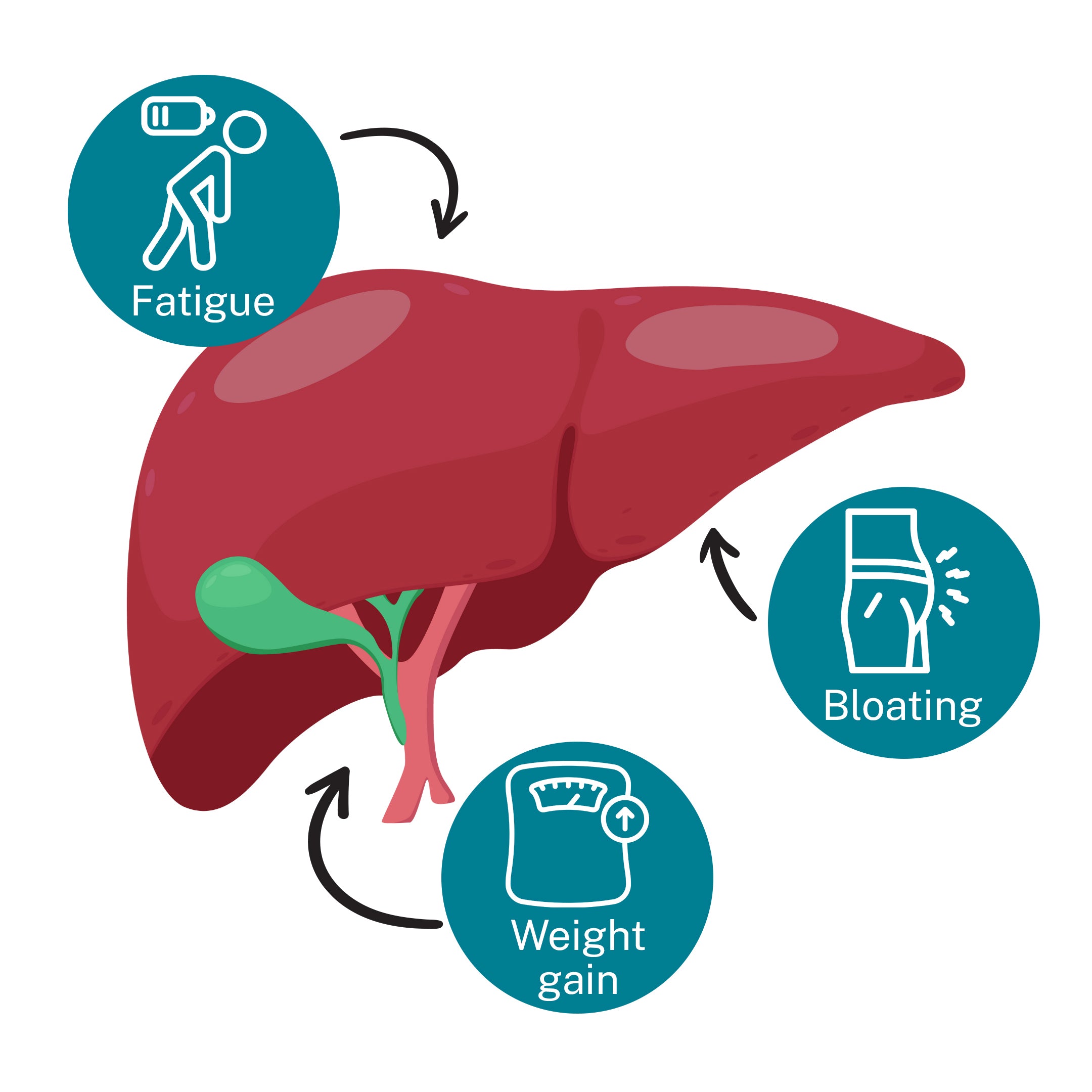
Why Your Symptoms Keep Getting Misdiagnosed
Modern medicine is organized around specialization. Your GP manages overall health. Your cardiologist handles your heart. Your endocrinologist deals with hormones. Your gastroenterologist focuses on digestion.
But your liver? Nobody specializes in "medication-induced liver stress" because it's not technically a disease. Your liver function tests might be normal. You don't have fatty liver disease or cirrhosis. So from a conventional medical perspective, there's nothing to treat.
Meanwhile, your liver is processing every single medication you take, every single day. And it's starting to struggle.
Here's the crucial thing to understand: Liver stress and liver disease are not the same thing.
Liver disease means measurable damage—elevated enzymes, fatty deposits, inflammation that shows up on scans. Liver stress means your liver is working harder than it should, depleting its resources, but not yet showing obvious signs of damage.
It's like the difference between a person who's overworked but still functioning, versus someone who's had a breakdown and can't work at all. The overworked person still shows up. Still does their job. But they're exhausted, irritable, and not performing at their best.
That's your liver on long-term medication.
And when your liver is stressed, it doesn't just affect your liver. It affects everything.
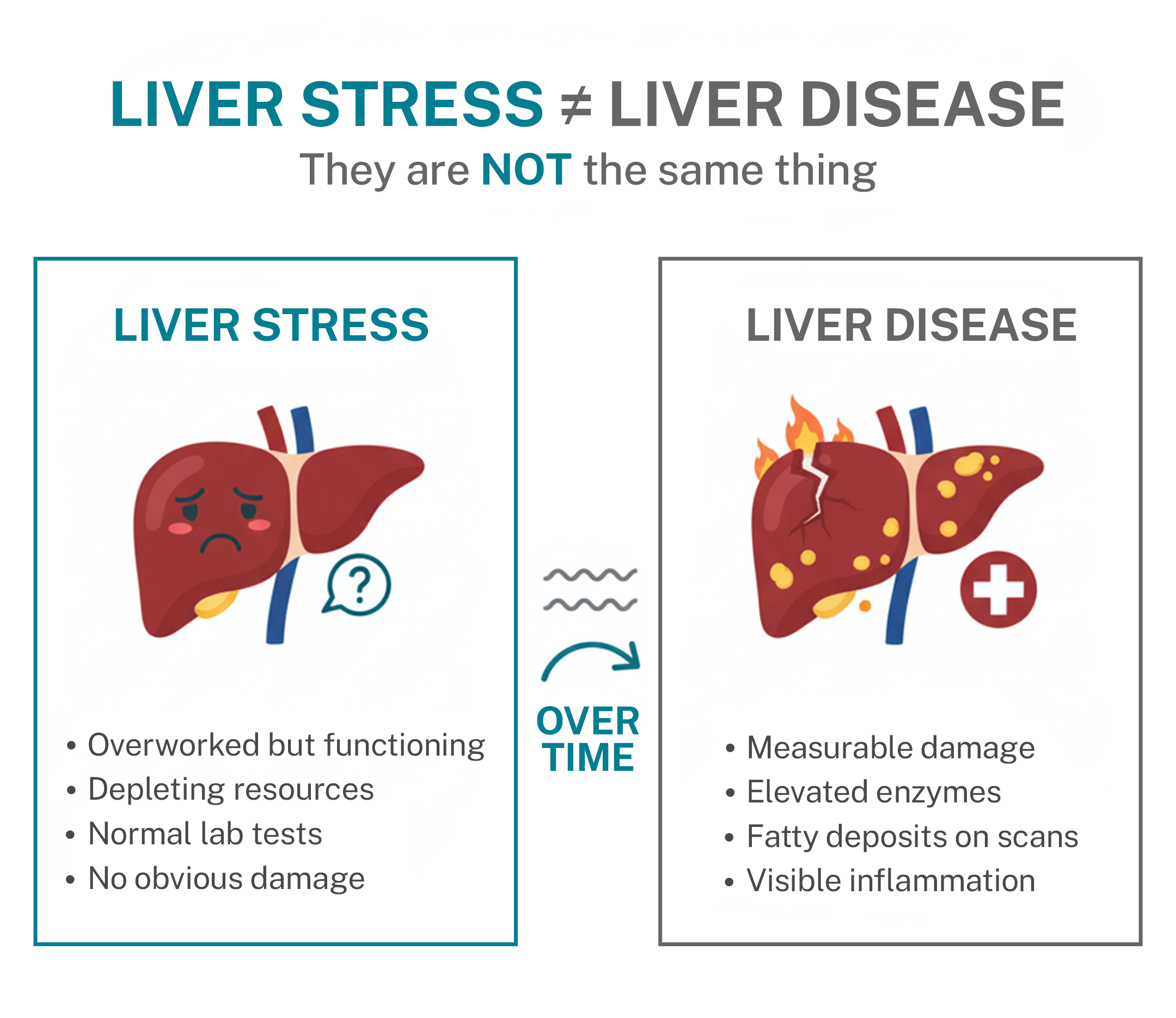
The Three-Symptom Pattern Explained
When your liver becomes overworked from processing multiple medications over months and years, three symptoms tend to appear together. They seem unrelated, which is why doctors treat them separately. But they're all connected to the same underlying problem.
Symptom #1: Persistent Fatigue

Your liver is your body's energy headquarters. It stores glucose as glycogen and releases it when you need energy. It processes proteins into usable amino acids. It regulates blood sugar levels between meals.
When your liver is spending all its resources processing medication, it can't manage energy production as efficiently. You feel tired even after a full night's sleep. You need caffeine just to function. You crash in the afternoon no matter what you eat.
This isn't the kind of tiredness that improves with rest. It's a deep, persistent fatigue that makes everything feel harder than it should.
Symptom #2: Bloating and Digestive Discomfort

Your liver produces bile—about 500-600ml every day. Bile is essential for breaking down fats and eliminating toxins through your digestive system.
When your liver is stressed from medication processing, bile production can become sluggish. Fats don't digest properly. Food sits in your stomach longer than it should. You feel bloated after meals, especially meals containing any fat.
You might also experience constipation, because proper bile flow is crucial for healthy bowel movements. The combination of poor fat digestion and slow elimination creates that uncomfortable, perpetually bloated feeling.
Symptom #3: Unexplained Weight Gain

This is perhaps the most frustrating symptom because it seems to make no sense. You're eating the same as you always have—maybe even less. You're trying to be active. But the weight keeps creeping up, especially around your middle.
Here's what's happening: Your liver regulates metabolism. It controls how your body stores and burns fat. It manages insulin sensitivity. When your liver is stressed, all of these functions become less efficient.
Additionally, when your liver can't process fats properly, it starts storing them—both in your liver itself and around your abdomen. The medical term is "visceral fat," and it's particularly stubborn because it's not caused by overeating—it's caused by metabolic dysfunction.
You could eat perfectly and exercise daily, but if your liver can't metabolize properly, the weight won't budge.
The Medication Connection
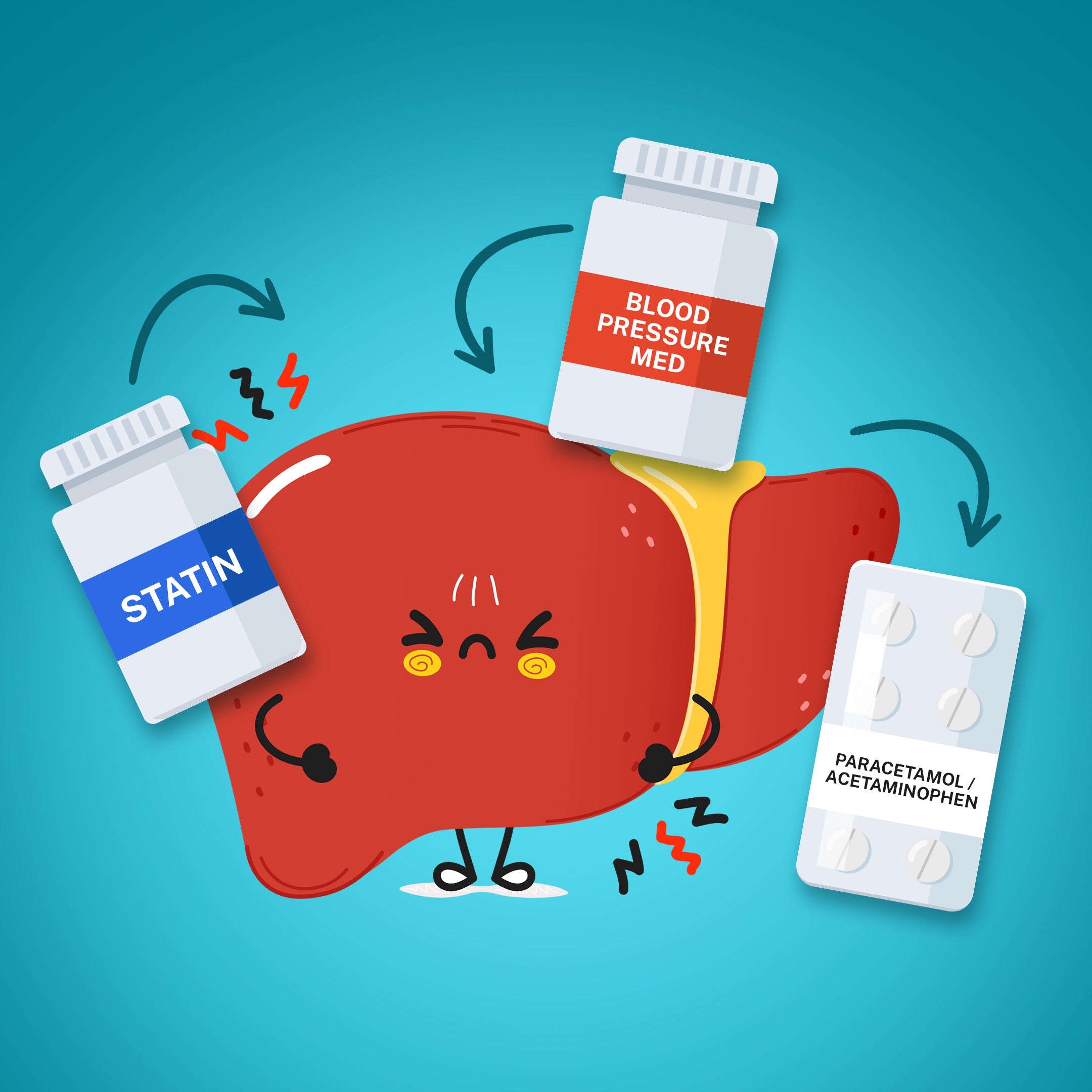
Not all medications affect the liver equally. But certain medications—especially when taken long-term or in combination—create significant liver workload.
Statins are metabolized extensively by the liver and can affect liver enzyme function, making it harder for your liver to handle other tasks efficiently.
Blood pressure medications, particularly ACE inhibitors and beta-blockers, must be processed by the liver daily. Over years, this creates cumulative stress.
Paracetamol, as we discussed earlier, depletes glutathione—your liver's master antioxidant. Regular use means constant drainage of your liver's protective reserves.
Antidepressants and anti-anxiety medications are primarily liver-metabolized, and many affect the same liver pathways as other medications, creating competition for processing capacity.
Thyroid medications, diabetes medications, hormone replacement therapy—the list goes on. Nearly every medication you take asks your liver to do extra work.
Here's the critical point: Each medication on its own might be fine. Your liver can handle it. The problem is cumulative load.
If you're taking three, four, or five medications daily—which millions of people over 50 are—your liver never gets a break. It's processing medication 24 hours a day, 7 days a week, year after year.
Eventually, something has to give. And what gives are the "optional" functions: optimal energy production, efficient metabolism, robust bile production.
You stay alive, but you don't feel well. And nobody connects the dots.
The Self-Assessment: Are Your Symptoms Liver-Related?
If you're experiencing fatigue, bloating, and weight gain, here's how to determine if your liver might be involved:
Question 1: Are you on long-term medication?
If you take any medication daily—especially cholesterol medication, blood pressure medication, pain relievers, or multiple medications—your liver is under increased workload.
Question 2: Do you have persistent fatigue that doesn't improve with rest?
Occasional tiredness is normal. But if you're tired every day, regardless of how much sleep you get, and it's been going on for months, that suggests something metabolic rather than simple sleep deprivation.
Question 3: Do you feel bloated after meals, especially meals with any fat?
Bloating from beans or carbonated drinks is one thing. But if you feel uncomfortable and distended after eating a piece of salmon or a handful of nuts, that suggests bile production issues.
Question 4: Have you gained weight despite not changing your diet or activity level?
Weight gain from eating more is straightforward. But if your habits haven't changed and the weight is accumulating anyway—especially around your middle—that points to metabolic dysfunction, not overeating.
Question 5: Do you have multiple symptoms that seem unrelated?
If you're tired AND bloated AND gaining weight, that pattern is more significant than any single symptom alone. It suggests a systemic issue rather than isolated problems.
Question 6: Have you seen multiple specialists without getting answers?
If you've been to several doctors, had numerous tests come back "normal," and still feel unwell, that's a strong indicator that you're dealing with functional stress rather than diagnosable disease.
If you answered yes to three or more of these questions—especially if you're on multiple medications—there's a very good chance your symptoms are liver-related.
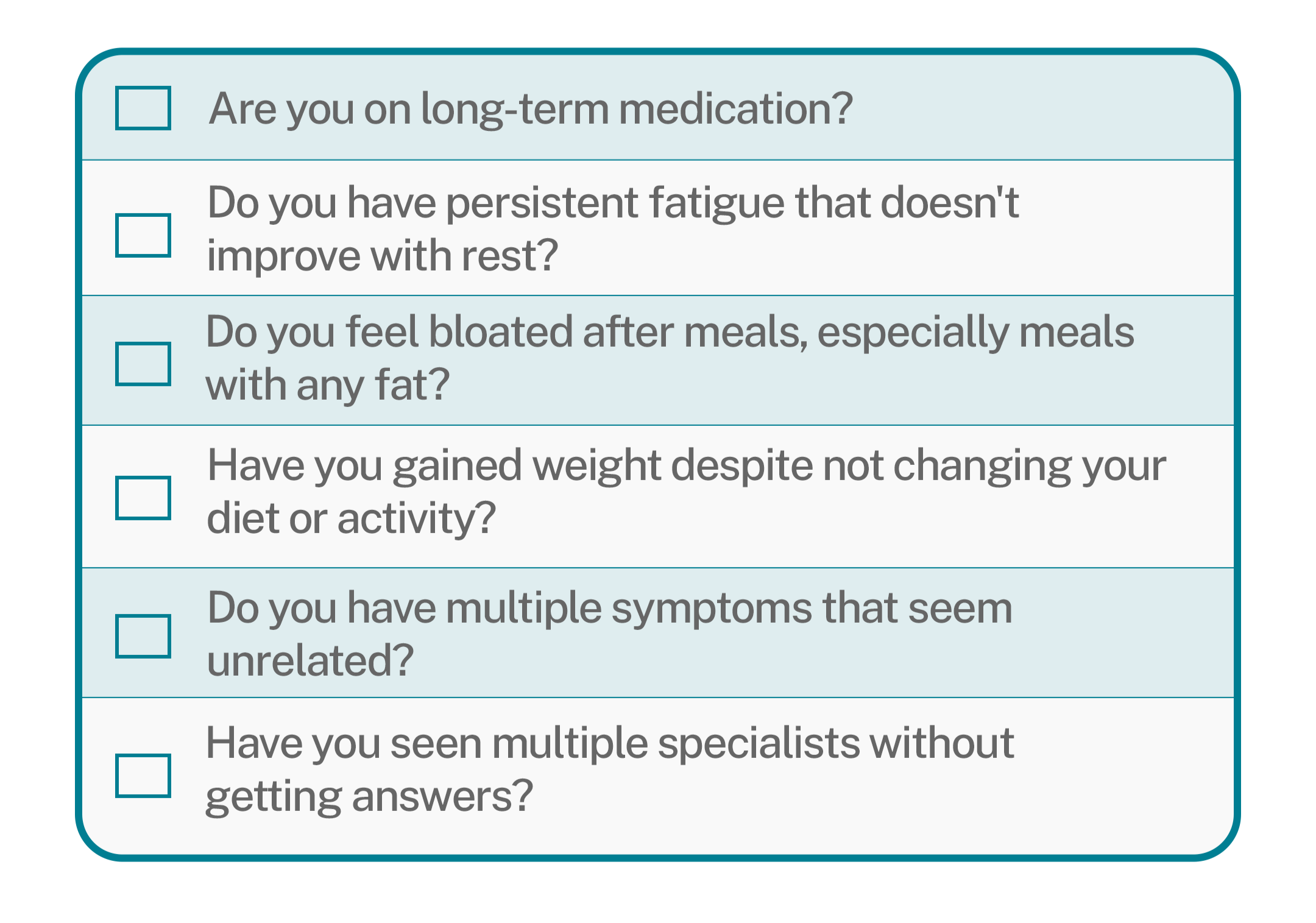
What Conventional Medicine Misses
Here's the gap in conventional healthcare: Blood tests are designed to detect disease, not stress.
Your GP orders a liver function test. It measures enzymes called ALT and AST. If these are elevated, it indicates liver damage. If they're normal, you're told your liver is fine.
But enzyme levels don't tell the whole story. They don't measure:
- How efficiently your liver is producing bile
- Whether your glutathione levels are depleted
- How well your liver is managing blood sugar regulation
- Whether your liver's detoxification pathways are overwhelmed
- How effectively your liver is metabolizing fats
You can have perfectly normal liver enzyme levels and still have a liver that's struggling under medication burden.
This is why people like Linda—people with multiple symptoms and normal test results—get dismissed or told their problems are unrelated. The tests aren't designed to catch what's actually wrong.
It's not that doctors are incompetent or don't care. It's that the system focuses on diagnosing disease, not on optimizing function or preventing problems before they become measurable.
By the time liver enzymes are elevated, significant damage has already occurred. The goal should be to support your liver BEFORE that happens—especially if you're on long-term medication.
The Comprehensive Solution
So what's the answer?
You can't just stop taking your medications. If you're on a statin, it's because you need cholesterol management. If you're on blood pressure medication, it's because your cardiovascular health requires it.
The solution isn't stopping your essential medications. It's giving your liver the comprehensive support it needs to handle those medications without sacrificing energy production, metabolism, and digestive function.
This requires a multi-layered approach:
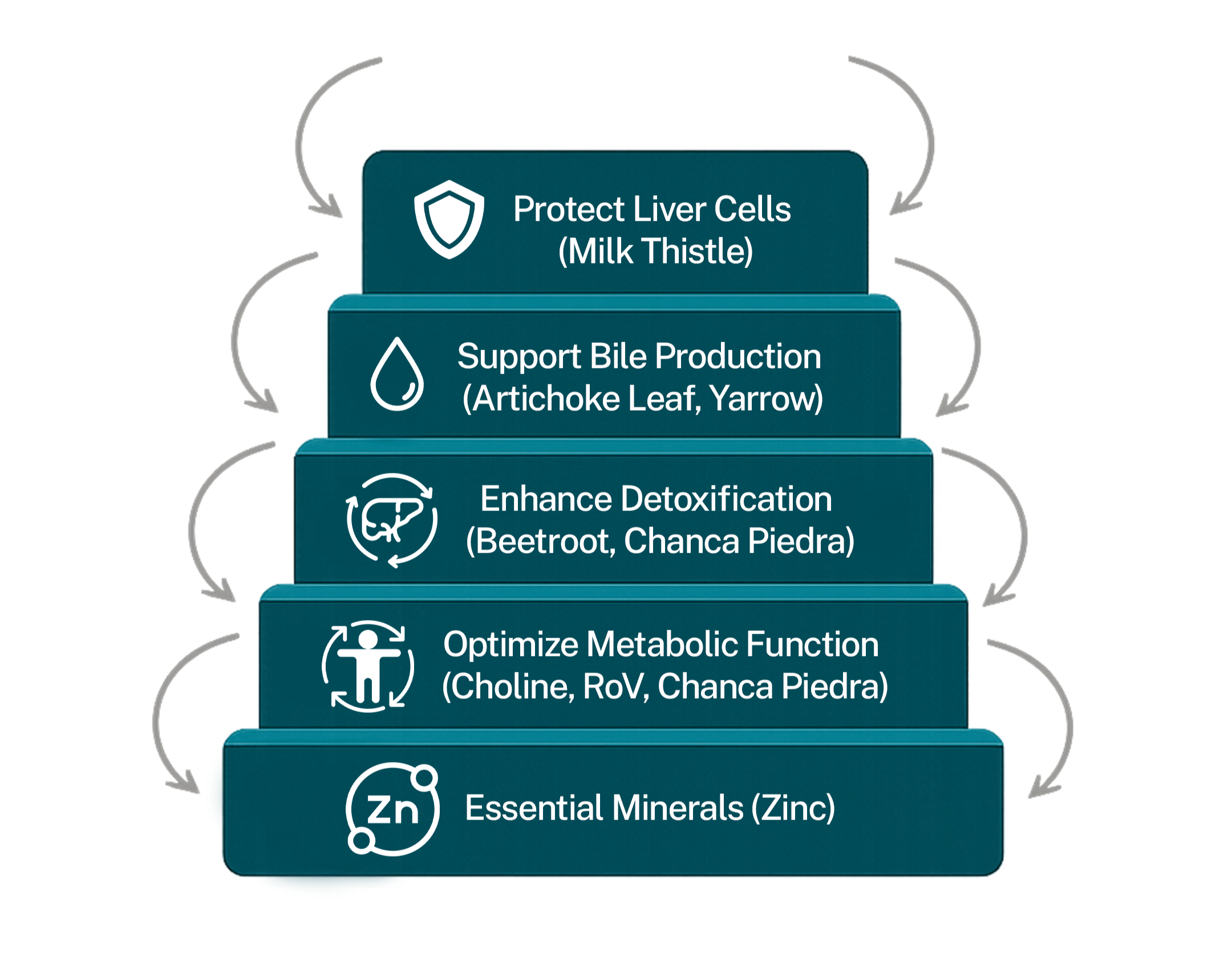
Layer 1: Protect Liver Cells
Milk thistle extract (silymarin) provides direct antioxidant protection to liver cells. It's been used for over 2,000 years and modern research confirms it reduces inflammation and supports liver cell regeneration—exactly what you need when your liver is processing multiple medications daily.
A therapeutic dose is 300mg of milk thistle seed extract, standardized for silymarin content.
Layer 2: Support Bile Production
Artichoke leaf extract and yarrow both promote healthy bile production. Bile is how your liver eliminates toxins and processes fats. When bile flow is optimal, bloating improves and fat digestion normalizes.
Effective doses are 100mg of artichoke leaf and 100mg of yarrow.
Layer 3: Enhance Detoxification
Dandelion root and chanca piedra support your liver's natural detoxification pathways. They help your liver process and eliminate medication byproducts more efficiently, reducing the accumulation of waste that contributes to fatigue.
Research supports 100mg of dandelion root extract (5:1 concentration) and 50mg of chanca piedra.
Layer 4: Optimize Metabolic Function
Choline is officially recognized for contributing to normal liver function. It's essential for fat metabolism—which is why inadequate choline leads to fat accumulation in the liver and around your middle.
Apple cider vinegar extract helps maintain healthy blood sugar levels, taking pressure off your liver's glucose regulation duties.
Beetroot supports healthy liver function and cardiovascular circulation, ensuring your liver gets the blood flow it needs to work efficiently.
Chicory root and beetroot together contribute to healthy metabolism and may help maintain healthy cholesterol levels naturally—supporting the same goal as your statin but through different mechanisms.
Layer 5: Provide Essential Minerals
Zinc is involved in over 300 enzyme reactions in your body, many occurring in the liver. When you're on medication, zinc requirements increase because it's needed for both medication processing and normal liver function.
A dose of 10mg daily ensures your liver has the zinc it needs to maintain all its functions simultaneously.
Why This Works When Nothing Else Has

The reason Linda spent 18 months seeing three different specialists without improvement is that each specialist treated one symptom in isolation.
The gastroenterologist addressed bloating with dietary changes—but didn't consider that the bloating was caused by poor bile production from liver stress.
The dietitian addressed weight gain with calorie restriction—but didn't consider that the weight gain was metabolic dysfunction, not overeating.
The GP addressed fatigue with sleep advice—but didn't consider that the fatigue was caused by a liver too busy processing medication to manage energy properly.
Each treatment failed because each missed the underlying cause.
When you address liver stress comprehensively—protecting liver cells, supporting bile production, enhancing detoxification, optimizing metabolism, and providing essential minerals—you're not treating symptoms. You're addressing the root cause.
And when you address the root cause, multiple symptoms improve simultaneously.
This is why people who support their liver properly often report feeling better in ways they didn't even realize were connected: better energy, less bloating, easier weight management, better sleep, clearer thinking, improved mood.
They weren't separate problems requiring separate solutions. They were one problem with multiple manifestations.
Real Stories From Real People

After 18 months of frustration, Linda started taking a comprehensive liver support formula containing milk thistle, choline, artichoke, dandelion, apple cider vinegar, yarrow, chanca piedra, beetroot, chicory root, and zinc.
She continued taking all her prescribed medications—the statin, the blood pressure medication, the paracetamol for her back.
Within four weeks, she noticed her energy improving. Not dramatically—she didn't suddenly feel 20 years younger. But she could get through the afternoon without needing a nap. She could focus better at work.
By eight weeks, the bloating had significantly reduced. She could eat a normal meal without feeling uncomfortable for hours afterward. Her clothes fit better, even though her weight hadn't changed yet.
By three months, she'd lost 6 pounds without changing her diet or exercise routine. The weight around her middle—the stubborn weight that wouldn't budge no matter what she tried—was finally starting to shift.
"I wish I'd known about this years ago," she said. "I wasted so much time and money on specialists when the answer was actually quite straightforward—my liver just needed proper support."
David, 61, was on four daily medications: a statin, blood pressure medication, a proton pump inhibitor for acid reflux, and paracetamol for arthritis. He'd been exhausted for years, dismissing it as "just getting old."

He started supporting his liver comprehensively. Within six weeks, his energy had improved noticeably. His wife commented that he seemed "more like himself" again. His bloating—which he'd lived with so long he'd stopped mentioning it—virtually disappeared.
"I didn't realize how bad I felt until I started feeling better," he explained. "I'd just accepted that this was how life was now. Turns out it didn't have to be."
What You Should Do Next
If you're exhausted, bloated, and gaining weight—and you're on long-term medication—your symptoms might not be "just aging" or unrelated problems.
They might be your liver telling you it needs comprehensive support to handle the daily workload you're asking it to manage.
You don't need to stop your essential medications. You need to give your liver the tools to process those medications without sacrificing energy, metabolism, and digestive function.
The evidence is clear: When your liver has adequate support—protection for liver cells, support for bile production, enhancement of detoxification pathways, optimization of metabolic function, and essential minerals—it can handle medication burden without causing the symptoms that are diminishing your quality of life.
This isn't about treating three separate problems. It's about addressing one underlying cause and watching multiple symptoms improve as a result.
The question is: Are you going to keep seeing different specialists, trying different diets, and feeling frustrated when nothing works? Or are you going to address what's actually causing your symptoms?
If you're serious about feeling better while staying on your essential medications, there's a comprehensive liver support formula specifically designed for people in your situation. It contains therapeutic doses of milk thistle, choline, artichoke leaf, dandelion root, apple cider vinegar extract, yarrow, chanca piedra, beetroot, chicory root, and zinc—the full spectrum of nutrients your liver needs to handle medication burden without causing fatigue, bloating, and weight gain.
Your liver works harder than any other organ. If you're asking it to process multiple medications daily, year after year, the least you can do is give it the comprehensive support it needs to do that job without sacrificing your energy, your comfort, and your quality of life.
Because you deserve to feel well, not just to have "normal" test results.
And with the right approach, you can.
Medical Disclaimer: This article is for educational purposes only and is not intended to replace professional medical advice. Never stop or change prescribed medication without consulting your doctor. If you're concerned about your liver health or medication effects, please consult your GP or healthcare provider.